(Comrade Aleks re-joins us with this interview of vocalist/guitarist Oskar Tunderberg from Finland’s Domovoyd.)
Domovoyd is an extravagant experimental doom quartet from Finnish Seinäjoki; the band have existed since 2010 and the guys were both talented and lucky enough to get a contract from Svart Records. Their music is dreamy, heavy, loud, and slow – it’s not for everyone, yes. But their albums Oh Sensibility (2013) and Domovoyd (2015) earned the band a solid reputation.
Oskar Tunderberg (vocals, guitars), Niko Lehdontie (guitars), Dmitry Melet (bass), and Axel Solimeis (drums) do their doom magic and weave their psychedelic spells into a heavy dormant trance. Are they still here? – I wondered. And yes, they answered, they are here. This interview with Oskar discovers different aspects of Domovoyd and shows some things from a new angle.
******
Hail Oskar! Domovoyd released a second, self-titled album in May 2015, and what’s the band’s current status?
Hello! We’re taking a break at the moment and waiting for our personal lives to calm down a little so we can get to work on the new material. Plenty of plans and ideas but not the right moment to jump in. Niko just came back from Oranssi Pazuzu’s European tour on which he was filling in for the other guitarist, I’m busy with my master’s thesis, as are Dmitry and Axel with their schools and projects. We’ve played the songs from Oh Sensibility and Domovoyd around Finland so much that we have decided to focus on the new material before doing anything else.
I have to ask you about the origin of the band’s name, as it sounds too similar to “domovoi”, a Russian sort of hobgoblin. So how did you come to this?
There are several meanings to the name and I feel that it constantly gets new ones, but yes one of the original references is the Slavic folklore creature. Dmitry is originally from Russia, so when we came up with the name about five years ago it was interesting to hear from him some stories that he has heard about this creature in his childhood. How the domovoi treats you is affected by how you treat your household; for example, if you don’t honor your home the domovoi might suffocate you during the night, which by the old folks is believed to be the cause of sleep paralysis.
These kind of myths and stories have been a great fuel for the constructing of Domovoyd’s own mythical world. For example on Domovoyd the story is about one’s personal journey to creating a new better self through giving up the control of the self to the subconcious entity that dwells in the temple of one’s mind. This reference to domovoi is one of the many that together with other culturally and philosophically ornamented stories and some personal experiences work as the foundation for the epic of the ‘voyd.
We’ve loved the name ever since because it has some power, in it that kinda creates a world around it. For me it is also the name of my personal salvation of some kind. Through this band that the name symbolises I have had so many wonderful and life-changing experiences that it has rooted itself in many levels of my life.
Your music is often described as psychedelic doom, though it has also drone components, how do you see its psychedelic aspect?
Well there’s components from all kinds of music really. Although we play heavy music we are greatly influenced by different styles and genres. For example, on Domovoyd you can hear influences from electronic music as well as from trip-hop, to mention some of the more untraditional ones. For me Domovoyd is full-blown psychedelic music. Psychedelia, in all of its ambiguity, is one of the defining features of our lives and it definitely feeds our music. Even we don’t know how to describe our music, and maybe that’s the beauty of it, but it surely is psychedelic ’cause it demands your attention and forces all kinds of feelings and thoughts to surface.
The Domovoyd album reflects various moods, from hypnotic and dreamy to hysterical and aggressive. What was your primary goal when you put out these tunes? Is it try to share your experience or to get rid of inner demons?
I partially answered to this in the previous questions already, but yeah, at least for me it was both, sharing and getting rid of things. The lyrics I wrote for the album are very personal but not for the bare eye. The story is filled with masks, veils, and symbols that are graspable and hopefully reflexible for the listener, but there’s a lot of thoughts hidden that are only shared between the members of the band.
Domovoyd was done very differently if compared to the earlier album Oh Sensibility. It was clear from the start that we wanted to try new approaches just to broaden our perspective and find some new ways to operate. So Domovoyd was more premeditated when compared to Oh Sensibility, which was mostly made during the moments of recording. On Domovoyd we wanted to create our own epic, a coherently progressing entirety, where the music carries the story and vice-versa. Musically it is heavier and more comfortless than the debut, although it encourages to sense through the dark cloud and see the colors that are hidden for the enjoyment of those who wish to be immersed by the album… “The He of the House is the supreme of all, for all of those who choose to follow… Clarity through distortion.. I reached the shrine within.”
Domovoyd – Domovoyd
Which role does sound production play in your song recording sessions? Can you leave some dirty touches to emphasize some songs’ nuances?
Undoubtedly we are driven by the sounds that we produce. Niko is the wizard in this subject, which is why I have sometimes referred to him as the oscillationmancer. I don’t know if there’s any sounds he couldn’t produce with his guitar. We’ve never had the need for synthesizers because of our capability of producing it all with what we already have, so if you’re ever wondering what the hell might make such a noise while listening to our music, it’s usually guitar. To add some new sounds (meaning something else than effected bass and guitars) we used for example a violin and a cello on the new album for some drone parts, and I must say that they suit the overall experience really well by bringing in some thick and dark organic tones that tune the listener in and out.
Speaking about the previous album Oh Sensibility, you once said that the vocals were recorded in a desert next to a sand dune, so how were you working over the Domovoyd tracks? Was it totally done in studio this time?
Well there aren’t any actual sand deserts in Finland, of course, but the vocals were recorded in a place closest to such an environment. There are some pictures from the place in our Facebook, so feel free to check out how it looked. Domovoyd was done entirely in a studio called Tonehaven in the idyllic countryside of Central Finland. It is owned by our dear friend Tom Brooke, who recorded and mixed the album. We recorded the whole album in eight days there. It was exhausting at times, but luckily we had a really nice sauna and Crash Bandicoot 2 to refresh us when needed. So no deserts this time, but for example the rant on the “Caustic Afterglow” was recorded after a week of drinking to really get the filth and shitty feeling in there.
Oskar, you were studying philosophy and musicology in the University of Jyväskylä — how do you use your knowledge in the Domovoyd sessions? And – visa-versa – does the experience of Domovoyd help you in your study?
Well yeah, although recently I have moved more towards ethnological and historical culture studies and more sociological fields like cultural policy. My normal days consists mostly of reading and writing, so all of that definitely has an influence on the musical matters, too. My fascination with cultures and philosophy has been, in addition to music, the thing that drives me forward and I like to combine all that as much as I can. If I don’t plainly use something that has greatly inspired me, there’s usually at least some hints about the deeper constructions behind the text or the music.
Being somewhat obsessed about how we humans create symbols and dress the most personal thoughts in the strangest allusions, I’m driven to experiment on that matter. When you learn every day something about the fundamental questions of us and the world or how we as humans act in this, you are driven to reflect on it through artistic ways because plain words often feel insufficient for expression. Being in Domovoyd has also greatly influenced my studies, of course. I’m actually writing at the moment my master’s thesis of cultural policy about the Finnish underground culture and music festivals related to it. The idea for it was born from the experiences and connections that we have gained in six years of touring around Finland and getting to know all kinds of amazing people.
Please tell a story of a most significant song of the Domovoyd album that represents the most distinguishing features of the band?
Picking up one song from an album that is meant to be considered as a whole is quite impossible for me. They are all significant in the way that only together they form a story that just happens to be divided into six parts. We also tend to make quite distinguishable songs in my opinion, so in a way they all represent our different features in different ways. I feel that you can’t really have an image of Domovoyd if it’s based on only one song. Put on your headphones, lay down on the couch or bed, take a little something if you like, give the whole album a spin while checking out the booklet that comes with the CD and LP, or keep your eyes closed and let your thoughts fly free. That is how you get the most out of Domovoyd and it probably gets you closest to the experience that we wanted to create.
Well, Oskar, by the way – how do you see the main features of your music?
I feel it’s impossible to analyze your own music from the listener’s point of view. I see the process of making music as an eternal circle that you can’t break free. The reason why we make our music, at least in my point of view, is that we want to create the kind of music that we ourselves want to listen to, but no matter how hard you try it’s impossible to step into the listener’s shoes and forget that you’ve been part of the creation process. It’s like reaching out for something but that something always manages to stay out of reach, and that is what drives you to do more.
And how do you see the band’s evolution from Oh Sensibility ’til now?
After six years of huge leaps and intense progressing I feel that we’re now at the point where we have to sit down for a while and rethink everything. We were very young when we started this band, so everything in it has become so integrated into our lives that saying something comprehensible about it is really hard. For me it’s like trying to describe the evolution of my family for someone who has never met me.
At the moment we’re all going through shifts in personal life that will undoubtedly shape the path we’re gonna take when the time comes. During the first years the band and everything related to it were a source of unconditional bliss, but of course the ugly sides of the music world have become more and more evident to us, so I guess with that and age we have at least become more skeptical. Musically we have always been keen to move forward and try new things to broaden our limits so the evolution has been fast but almost invisible for ourselves. Only time will show what comes up next, but the ideas we’ve had for the next album definitely tell me that there are many evolutionary steps to be taken again.
What are your ambitions considering Domovoyd? And do you care about communications between the band and listeners?
Our main ambition of course is to make music. It’s a cliché but music should always come first. We want to create music that is Domovoyd, music that gives the one-of-a-kind experience you can’t get from anywhere else. We’ve also been very ambitious about our live performances so we want to give our best and fullest every time. Although we may seem on stage like we are totally immersed in a chaotic world of our own, we wish that the audience could join us on those trips, and based on what I’ve seen and heard they usually can. Seeing someone go bat shit crazy or sitting quietly and meditating in the front row gives me such a burst of happiness that there’s hardly any better experience than that. Knowing that something we play can free other people, too, if only for the duration of a gig or an album, motivates me to always aim for it. So based on that, I’d say that the communication between band and listeners is very important.
We appreciate the feedback we get from the gigs and through e-mail, for example, and we try to take notice of anyone who has something to say to us. That doesn’t mean however that we should exist only to serve others, because we have our own lives to live and at the moment there isn’t much time to spare for others. That is why we are not interested about advertising us in every social media and spamming our shit everywhere. I already feel like we’re giving too much of ourselves sometimes, and it can eat you up quickly.
The truth is that we are in this mainly for ourselves. I’m not sure if I’m speaking for all of us or just for myself, but for me it is something I want but also need to do. It is my lifeline, a sanctuary where I can forget everything and become a part of something unexplainably beautiful. I can’t experience it anywhere else anymore. I have these three amazing brothers who I’ve grown up with and who I’ve loved and hated, and the band has always been in the center of it. I wish everyone could experience that.
Photos by Lassi Männikkö, Simo P.J. Ulvi
https://www.facebook.com/domovoyd

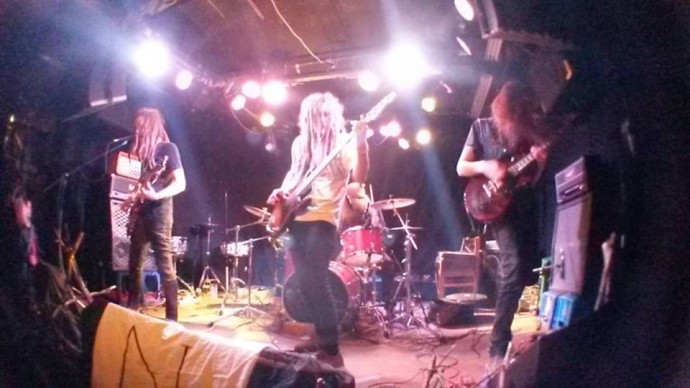
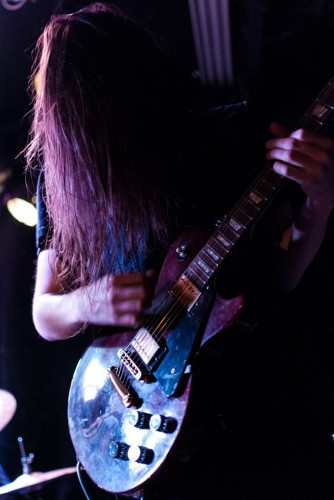
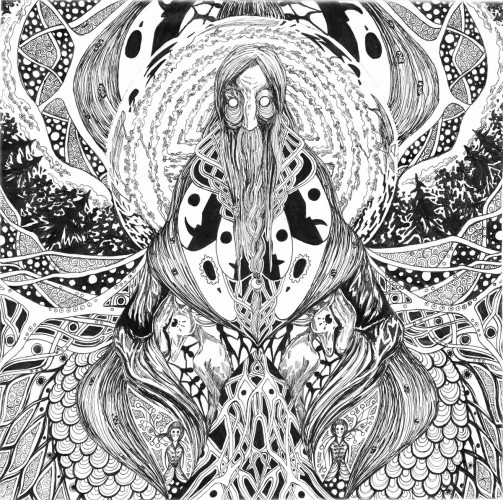
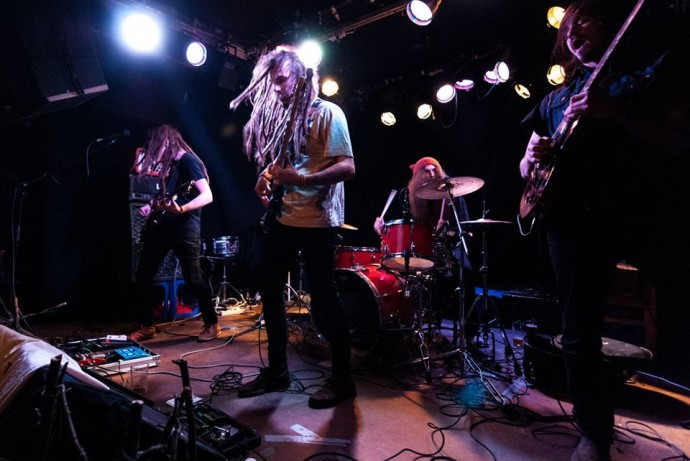
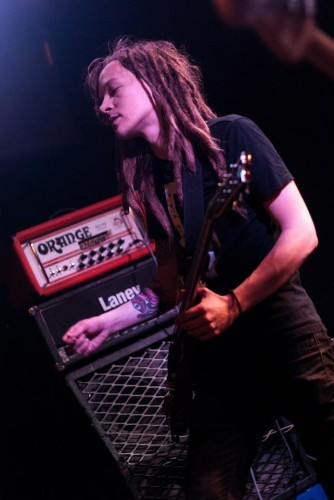
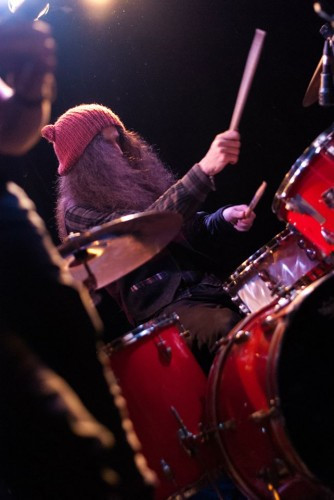
I have “Oh Sensibility” and love it! Great album to put on after (allegedly) smoking weed.